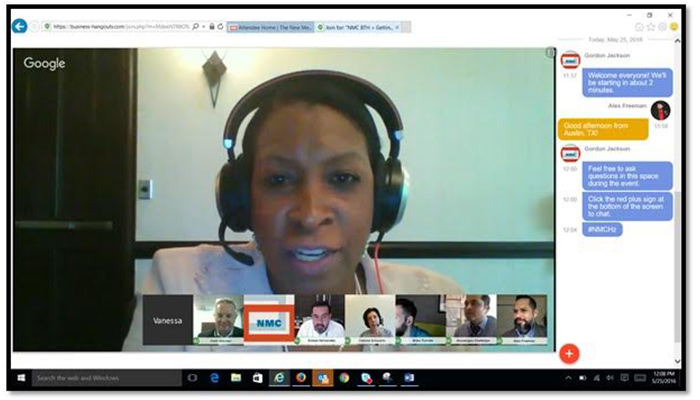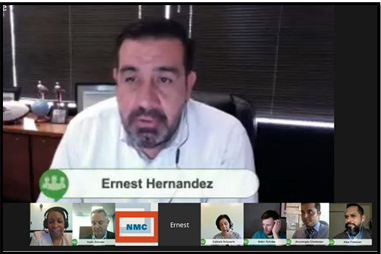
Personalization is a powerful tool; when applied to education, it can improve student success.
Students entering higher education bring their own stories and approaches to learning based on their diverse backgrounds with them. However, their goal is almost always the same: to graduate.
Personalized learning can help them achieve that. The approach adds value and can be used as an effective tool for student success. Technology provides us with the power to personalize higher education for students. Each institution and student within it has his or her own unique journey.
Two leaders from the University of Texas at San Antonio (UTSA) Office of Information Technology (OIT) recently had the opportunity to share their insight on the subject, and discuss the components of UTSA's iPASS project that support it personalized learning during a live webinar for the New Media Consortium (NMC).
Collaborating on Personalized Learning in Higher Education

Ernest Hernandez III, Director of Video Technology at the University of Texas at San Antonio, presenting to faculty during the NMC Getting Personal webinar.
According to a recent NMC publication, personalized learning focuses on the learner driving his or her own learning. The organization's May 25 webinar on the topic, titled "Getting Personal," is part of its Beyond the Horizon series. This series ties into the NMC's Horizon Project, which provides advice to educators across the globe to build upon innovation for teaching, learning, and creative inquiry.
The webinar highlighted work currently underway in personalized learning, including support services. The panel discussed personalized learning components, including competency based education, digital curriculum and student support, and communication.
Dr. Celeste Schwartz, Vice President for Information Technology and College Services at Montgomery County Community College, moderated the webinar, which included a panel of higher education professionals across the nation. Including UTSA's Assistant Vice Provost for Information Technology Dr. Vanessa Hammler Kenon and Director of Video Technology Ernest Hernandez III, Kaplan University's Vice President for Academic Operations at Kaplan University Keith Brender and the Director of Technology Enhancement Learning (TEL) at Plymouth University, Dr. Arunangus Chatterjee.
Through iPASS, UTSA's leadership has had significant hands-on experience in designing and implementing services to support personalized learning in higher education.
Applying Personalized Learning in Advising and Student Support Services
Several systems to improve student advising have been implemented at UTSA with the support of iPASS resources, including DegreeWorks and the UTSA Campus platform, created using the Educational Advisory Board's Student Success Collaborative. These implementations are constantly reviewed in pursuit of the best tools to support student's needs.
DegreeWorks, the project's educational planning component, has allowed students to explore degree plans and possible paths to graduation. With the introduction of the UTSA Campus platform this year, advisors and other support staff across the university are now able to have a holistic view of their students. These technologies will provide staff with more time to interact with students by increasing information efficiency, while removing any redundancies within various staff members' notes.
The UTSA Campus platform will allow the university to empower students in their decision-making by providing applicable information and resources, ranging from tutoring referrals to recommended financial aid.
Mobilizing Student Success
"Students today are a lot more mobile….you have to take learning to where the students are," Vanessa Kenon, Ed.D. Assistant Vice Provost for IT, UTSA.
Understanding the student perspective and experience is paramount to success in these initiatives. Because of this, UTSA's OIT surveys students throughout the year in order to identify how to improve technology and aid student success. Recently, mobile accessibility of resources has become a highlighted issue. During the webinar, Dr. Kenon stated that, "Students today are a lot more mobile….you have to take learning to where the students are." Students seek more than static websites; they want tools that make relevant information accessible quickly and simply.
OIT has improved its mobile app each semester by adding features ranging from class assignments to dining options (after all—a hungry student is not a happy student). One of the goals of the iPASS project is to integrate features from the advising tools into the UTSA mobile app as well. This would allow students to easily access accurate academic information. They could also view administrative issues, and even schedule an advising session.
Promotion of the mobile app has expanded this semester. Our marketing campaign will inform students of the app's current features and educate them on how the app can help them in managing their academic careers. Upcoming features will also be highlighted in an effort to increase students' use of tools such as UTSA Campus and DegreeWorks. UTSA is optimistic that providing access to this information in a user-friendly format will empower students to become self-directed learners, and that it will ultimately support student success at the institution.
Rosalind Ong De Trevino serves as a project coordinator in the Office of Information Technology at the University of Texas at San Antonio.
Hero image: Dr. Vanessa Hammler Kenon, Assistant Vice Provost for IT at the University of Texas at San Antonio, presenting during the NMC Getting Personal webinar on May 25.
